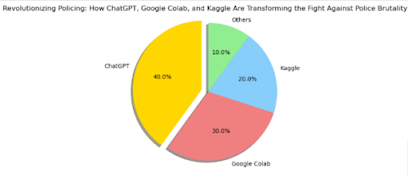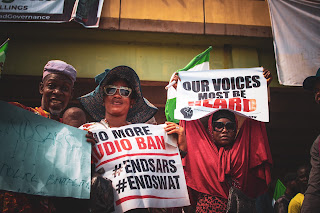The Impact of Police Brutality on the Mental Health of Nigerian Citizens
Police brutality has been a major problem across the world for generations. It can have devastating effects on the people who experience it and those who witness it, particularly when it is persistent in a particular area. In Nigeria, police brutality has been a pervasive issue for many years and its effects on mental health are particularly severe. Nigeria, the most populous country in Africa, has been grappling with a long-standing issue of police brutality.
Incidents of excessive force, harassment, and extortion by the Nigerian police force have left a profound impact on the mental health of its citizens. This article aims to explore the multifaceted consequences of police brutality on the psychological well-being of Nigerians. By shedding light on the experiences of victims and the broader societal implications, we can better understand the urgent need for reform and support for those affected.
In Nigeria, the police are charged with protecting and serving the citizens, yet many people report feeling unsafe in their presence due to fear of abuse and mistreatment. This fear is reflected in the high levels of police brutality reported in Nigeria. According to a report by Amnesty International, Nigeria has the second highest rate of police brutality in the world. This is especially concerning given the prevalence of mental health issues in the country.
In recent years, Nigeria has witnessed widespread protests against police brutality and the unjust treatment of its citizens by law enforcement agencies. The #EndSARS movement, which gained global attention, shed light on the devastating consequences of police brutality on the mental health of Nigerian citizens. This article aims to explore the multifaceted impact of police brutality on mental health, highlighting the psychological trauma, fear, and distrust it instills within individuals and communities.
1. The Prevalence of Police Brutality in Nigeria
To understand the impact, it is crucial to acknowledge the prevalence of police brutality in Nigeria. The Special Anti-Robbery Squad (SARS), initially established to combat armed robbery, has gained notoriety for its human rights abuses, including arbitrary arrests, extortion, torture, and extrajudicial killings. The experiences of innocent civilians subjected to such brutality are pervasive, leading to profound psychological distress.
2. Psychological Trauma: Anxiety, Depression, and PTSD
Police brutality inflicts severe psychological trauma on its victims, contributing to the development or exacerbation of mental health conditions. Anxiety and depression are common consequences, as individuals struggle with fear, helplessness, and a constant sense of danger. Post-Traumatic Stress Disorder (PTSD) may also emerge, with victims experiencing flashbacks, nightmares, and hypervigilance long after the traumatic incident.
3. Fear and Distrust in Law Enforcement
The consistent exposure to police brutality creates a pervasive fear among Nigerian citizens, eroding their trust in law enforcement agencies. This fear and distrust can hinder individuals from seeking help, reporting crimes, or engaging with the justice system. The resulting lack of confidence in the authorities perpetuates a cycle of impunity and further exacerbates mental health issues in communities.
4. Social Stigma and Isolation
Victims of police brutality often face social stigma and isolation, as their experiences are met with disbelief, victim-blaming, or indifference. This isolation can lead to a sense of powerlessness and isolation, exacerbating mental health conditions and inhibiting individuals from seeking support or sharing their traumatic experiences.
5. Intergenerational Effects and Community Impact
The impact of police brutality extends beyond individual experiences, affecting families and communities. Children who witness or hear about acts of police brutality may develop emotional and behavioral problems, perpetuating the cycle of trauma across generations. Entire communities suffer from collective trauma, leading to a breakdown in social cohesion and overall well-being.
6. Coping Mechanisms and Resilience
Despite the profound impact of police brutality, many Nigerians have demonstrated resilience and developed coping mechanisms. Activism, community support, and advocacy for justice have provided avenues for healing and empowerment. Highlighting these positive responses can foster hope and encourage further efforts to address the mental health consequences of police brutality.
Conclusion
The impact of police brutality on the mental health of Nigerian citizens is profound and far-reaching. Psychological trauma, fear, and distrust become ingrained in individuals and communities, perpetuating a cycle of distress and hindering social progress. It is imperative that the Nigerian government takes concrete steps to address police brutality, enforce accountability, and prioritize the mental well-being of its citizens. By acknowledging the long-lasting effects of police brutality on mental health, fostering a culture of empathy and support, and promoting systemic reforms, Nigeria can begin the healing process, restore trust, and create an environment that prioritizes the well-being of all its citizens. Furthermore, research has also shown that individuals living in communities where police brutality is prevalent are more likely to suffer from mental health disorders such as depression and anxiety. This is due to the trauma and fear they experience on a daily basis, as well as the lack of trust they have in the police. This can have a profound effect on a person’s mental health, as they become overwhelmed and unable to cope with the constant stress and fear.
The impact of police brutality on mental health can have long-term effects, particularly if it is not addressed. People may struggle to cope with their emotions and can become withdrawn, feeling unable to trust and connect with other people. This is especially true for those living in communities where police brutality is a persistent problem. It is clear that police brutality has a detrimental effect on the mental health of Nigerian citizens. It creates a sense of fear and mistrust in the community, which can lead to feelings of isolation and depression. Furthermore, people who have experienced or witnessed police brutality may experience psychological symptoms such as anxiety, depression, and PTSD. In order to ensure the mental health of Nigerian citizens, police brutality must be addressed and the individuals affected must be provided with the necessary support.




Comments
Post a Comment